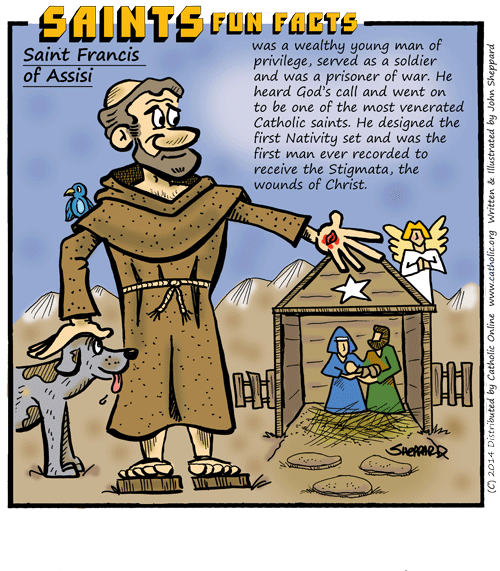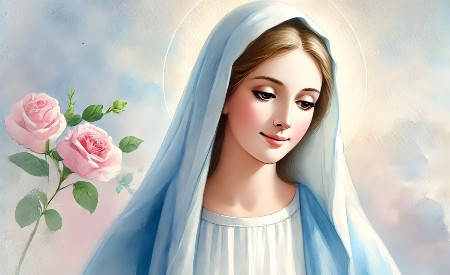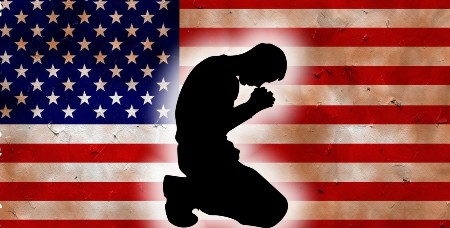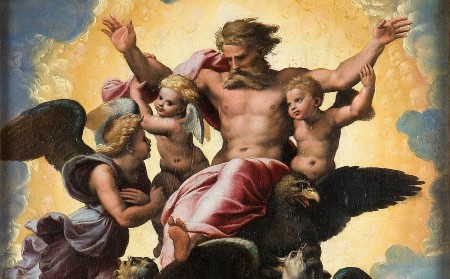St. Francis of Assisi
Facts
Patron: of Animals, Merchants & Ecology
Birth: 1181
Death: 1226
Author and Publisher - Catholic Online
Printable PDF of St. Francis of Assisi
Shop St. Francis of Assisi

Founder of the Franciscan Order, born at Assisi in Umbria, in 1181.
In 1182, Pietro Bernardone returned from a trip to France to find out his wife had given birth to a son. Far from being excited or apologetic because he'd been gone, Pietro was furious because she'd had his new son baptized Giovanni after John the Baptist. The last thing Pietro wanted in his son was a man of God -- he wanted a man of business, a cloth merchant like he was, and he especially wanted a son who would reflect his infatuation with France. So he renamed his son Francesco -- which is the equivalent of calling him Frenchman.
Francis enjoyed a very rich easy life growing up because of his father's wealth and the permissiveness of the times. From the beginning everyone -- and I mean everyone -- loved Francis. He was constantly happy, charming, and a born leader. If he was picky, people excused him. If he was ill, people took care of him. If he was so much of a dreamer he did poorly in school, no one minded. In many ways he was too easy to like for his own good. No one tried to control him or teach him.
As he grew up, Francis became the leader of a crowd of young people who spent their nights in wild parties. Thomas of Celano, his biographer who knew him well, said, "In other respects an exquisite youth, he attracted to himself a whole retinue of young people addicted to evil and accustomed to vice." Francis himself said, "I lived in sin" during that time.
Francis fulfilled every hope of Pietro's -- even falling in love with France. He loved the songs of France, the romance of France, and especially the free adventurous troubadours of France who wandered through Europe. And despite his dreaming, Francis was also good at business. But Francis wanted more..more than wealth. But not holiness! Francis wanted to be a noble, a knight. Battle was the best place to win the glory and prestige he longed for. He got his first chance when Assisi declared war on their longtime enemy, the nearby town of Perugia.
Most of the troops from Assisi were butchered in the fight. Only those wealthy enough to expect to be ransomed were taken prisoner. At last Francis was among the nobility like he always wanted to be...but chained in a harsh, dark dungeon. All accounts say that he never lost his happy manner in that horrible place. Finally, after a year in the dungeon, he was ransomed. Strangely, the experience didn't seem to change him. He gave himself to partying with as much joy and abandon as he had before the battle.
The experience didn't change what he wanted from life either: Glory. Finally a call for knights for the Fourth Crusade gave him a chance for his dream. But before he left Francis had to have a suit of armor and a horse -- no problem for the son of a wealthy father. And not just any suit of armor would do but one decorated with gold with a magnificent cloak. Any relief we feel in hearing that Francis gave the cloak to a poor knight will be destroyed by the boasts that Francis left behind that he would return a prince.
But Francis never got farther than one day's ride from Assisi. There he had a dream in which God told him he had it all wrong and told him to return home. And return home he did. What must it have been like to return without ever making it to battle -- the boy who wanted nothing more than to be liked was humiliated, laughed at, called a coward by the village and raged at by his father for the money wasted on armor.
Francis' conversion did not happen over night. God had waited for him for twenty-five years and now it was Francis' turn to wait. Francis started to spend more time in prayer. He went off to a cave and wept for his sins. Sometimes God's grace overwhelmed him with joy. But life couldn't just stop for God. There was a business to run, customers to wait on.
One day while riding through the countryside, Francis, the man who loved beauty, who was so picky about food, who hated deformity, came face to face with a leper. Repelled by the appearance and the smell of the leper, Francis nevertheless jumped down from his horse and kissed the hand of the leper. When his kiss of peace was returned, Francis was filled with joy. As he rode off, he turned around for a last wave, and saw that the leper had disappeared. He always looked upon it as a test from God...that he had passed.
His search for conversion led him to the ancient church at San Damiano. While he was praying there, he heard Christ on the crucifix speak to him, "Francis, repair my church." Francis assumed this meant church with a small c -- the crumbling building he was in. Acting again in his impetuous way, he took fabric from his father's shop and sold it to get money to repair the church. His father saw this as an act of theft -- and put together with Francis' cowardice, waste of money, and his growing disinterest in money made Francis seem more like a madman than his son. Pietro dragged Francis before the bishop and in front of the whole town demanded that Francis return the money and renounce all rights as his heir.
The bishop was very kind to Francis; he told him to return the money and said God would provide. That was all Francis needed to hear. He not only gave back the money but stripped off all his clothes -- the clothes his father had given him -- until he was wearing only a hair shirt. In front of the crowd that had gathered he said, "Pietro Bernardone is no longer my father. From now on I can say with complete freedom, 'Our Father who art in heaven.'" Wearing nothing but castoff rags, he went off into the freezing woods -- singing. And when robbers beat him later and took his clothes, he climbed out of the ditch and went off singing again. From then on Francis had nothing...and everything.
Francis went back to what he considered God's call. He begged for stones and rebuilt the San Damiano church with his own hands, not realizing that it was the Church with a capital C that God wanted repaired. Scandal and avarice were working on the Church from the inside while outside heresies flourished by appealing to those longing for something different or adventurous.
Soon Francis started to preach. (He was never a priest, though he was later ordained a deacon under his protest.) Francis was not a reformer; he preached about returning to God and obedience to the Church. Francis must have known about the decay in the Church, but he always showed the Church and its people his utmost respect. When someone told him of a priest living openly with a woman and asked him if that meant the Mass was polluted, Francis went to the priest, knelt before him, and kissed his hands -- because those hands had held God.
Slowly companions came to Francis, people who wanted to follow his life of sleeping in the open, begging for garbage to eat...and loving God. With companions, Francis knew he now had to have some kind of direction to this life so he opened the Bible in three places. He read the command to the rich young man to sell all his good and give to the poor, the order to the apostles to take nothing on their journey, and the demand to take up the cross daily. "Here is our rule," Francis said -- as simple, and as seemingly impossible, as that. He was going to do what no one thought possible any more -- live by the Gospel. Francis took these commands so literally that he made one brother run after the thief who stole his hood and offer him his robe!
Francis never wanted to found a religious order -- this former knight thought that sounded too military. He thought of what he was doing as expressing God's brotherhood. His companions came from all walks of life, from fields and towns, nobility and common people, universities, the Church, and the merchant class. Francis practiced true equality by showing honor, respect, and love to every person whether they were beggar or pope.
Francis' brotherhood included all of God's creation. Much has been written about Francis' love of nature but his relationship was deeper than that. We call someone a lover of nature if they spend their free time in the woods or admire its beauty. But Francis really felt that nature, all God's creations, were part of his brotherhood. The sparrow was as much his brother as the pope.
In one famous story, Francis preached to hundreds of birds about being thankful to God for their wonderful clothes, for their independence, and for God's care. The story tells us the birds stood still as he walked among him, only flying off when he said they could leave.
Another famous story involves a wolf that had been eating human beings. Francis intervened when the town wanted to kill the wolf and talked the wolf into never killing again. The wolf became a pet of the townspeople who made sure that he always had plenty to eat.
Following the Gospel literally, Francis and his companions went out to preach two by two. At first, listeners were understandably hostile to these men in rags trying to talk about God's love. People even ran from them for fear they'd catch this strange madness! And they were right. Because soon these same people noticed that these barefoot beggars wearing sacks seemed filled with constant joy. They celebrated life. And people had to ask themselves: Could one own nothing and be happy? Soon those who had met them with mud and rocks, greeted them with bells and smiles.
Francis did not try to abolish poverty, he tried to make it holy. When his friars met someone poorer than they, they would eagerly rip off the sleeve of their habit to give to the person. They worked for all necessities and only begged if they had to. But Francis would not let them accept any money. He told them to treat coins as if they were pebbles in the road. When the bishop showed horror at the friars' hard life, Francis said, "If we had any possessions we should need weapons and laws to defend them." Possessing something was the death of love for Francis. Also, Francis reasoned, what could you do to a man who owns nothing? You can't starve a fasting man, you can't steal from someone who has no money, you can't ruin someone who hates prestige. They were truly free.
Francis was a man of action. His simplicity of life extended to ideas and deeds. If there was a simple way, no matter how impossible it seemed, Francis would take it. So when Francis wanted approval for his brotherhood, he went straight to Rome to see Pope Innocent III. You can imagine what the pope thought when this beggar approached him! As a matter of fact he threw Francis out. But when he had a dream that this tiny man in rags held up the tilting Lateran basilica, he quickly called Francis back and gave him permission to preach.
Sometimes this direct approach led to mistakes that he corrected with the same spontaneity that he made them. Once he ordered a brother who hesitated to speak because he stuttered to go preach half-naked. When Francis realized how he had hurt someone he loved he ran to town, stopped the brother, took off his own clothes, and preached instead.
Francis acted quickly because he acted from the heart; he didn't have time to put on a role. Once he was so sick and exhausted, his companions borrowed a mule for him to ride. When the man who owned the mule recognized Francis he said, "Try to be as virtuous as everyone thinks you are because many have a lot of confidence in you." Francis dropped off the mule and knelt before the man to thank him for his advice.
Another example of his directness came when he decided to go to Syria to convert the Moslems while the Fifth Crusade was being fought. In the middle of a battle, Francis decided to do the simplest thing and go straight to the sultan to make peace. When he and his companion were captured, the real miracle was that they weren't killed. Instead Francis was taken to the sultan who was charmed by Francis and his preaching. He told Francis, "I would convert to your religion which is a beautiful one -- but both of us would be murdered."
Francis did find persecution and martyrdom of a kind -- not among the Moslems, but among his own brothers. When he returned to Italy, he came back to a brotherhood that had grown to 5000 in ten years. Pressure came from outside to control this great movement, to make them conform to the standards of others. His dream of radical poverty was too harsh, people said. Francis responded, "Lord, didn't I tell you they wouldn't trust you?"
He finally gave up authority in his order -- but he probably wasn't too upset about it. Now he was just another brother, like he'd always wanted.
Francis' final years were filled with suffering as well as humiliation. Praying to share in Christ's passion he had a vision received the stigmata, the marks of the nails and the lance wound that Christ suffered, in his own body.
Years of poverty and wandering had made Francis ill. When he began to go blind, the pope ordered that his eyes be operated on. This meant cauterizing his face with a hot iron. Francis spoke to "Brother Fire": "Brother Fire, the Most High has made you strong and beautiful and useful. Be courteous to me now in this hour, for I have always loved you, and temper your heat so that I can endure it." And Francis reported that Brother Fire had been so kind that he felt nothing at all.
How did Francis respond to blindness and suffering? That was when he wrote his beautiful Canticle of the Sun that expresses his brotherhood with creation in praising God.
Francis never recovered from this illness. He died on October 4, 1226 at the age of 45. Francis is considered the founder of all Franciscan orders and the patron saint of ecologists and merchants.
Join the Movement
When you sign up below, you don't just join an email list - you're joining an entire movement for Free world class Catholic education.
-

-
Mysteries of the Rosary
-
St. Faustina Kowalska
-
Litany of the Blessed Virgin Mary
-
Saint of the Day for Wednesday, Oct 4th, 2023
-
Popular Saints
-
St. Francis of Assisi
-
Bible
-
Female / Women Saints
-
7 Morning Prayers you need to get your day started with God
-
Litany of the Blessed Virgin Mary
Daily Catholic
 Daily Readings for Thursday, October 31, 2024
Daily Readings for Thursday, October 31, 2024 St. Wolfgang: Saint of the Day for Thursday, October 31, 2024
St. Wolfgang: Saint of the Day for Thursday, October 31, 2024 Memorare: Prayer of the Day for Thursday, October 31, 2024
Memorare: Prayer of the Day for Thursday, October 31, 2024- Daily Readings for Wednesday, October 30, 2024
- St. Alphonsus Rodriguez: Saint of the Day for Wednesday, October 30, 2024
- Prayer to the Holy Spirit # 2: Prayer of the Day for Wednesday, October 30, 2024
![]()
Copyright 2024 Catholic Online. All materials contained on this site, whether written, audible or visual are the exclusive property of Catholic Online and are protected under U.S. and International copyright laws, © Copyright 2024 Catholic Online. Any unauthorized use, without prior written consent of Catholic Online is strictly forbidden and prohibited.
Catholic Online is a Project of Your Catholic Voice Foundation, a Not-for-Profit Corporation. Your Catholic Voice Foundation has been granted a recognition of tax exemption under Section 501(c)(3) of the Internal Revenue Code. Federal Tax Identification Number: 81-0596847. Your gift is tax-deductible as allowed by law.













 Daily Readings for Thursday, October 31, 2024
Daily Readings for Thursday, October 31, 2024 St. Wolfgang: Saint of the Day for Thursday, October 31, 2024
St. Wolfgang: Saint of the Day for Thursday, October 31, 2024 Memorare: Prayer of the Day for Thursday, October 31, 2024
Memorare: Prayer of the Day for Thursday, October 31, 2024

